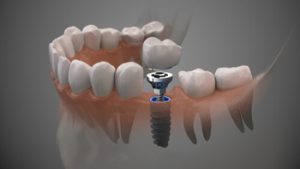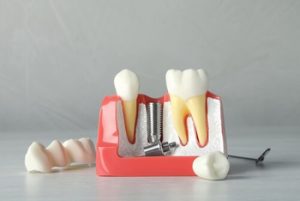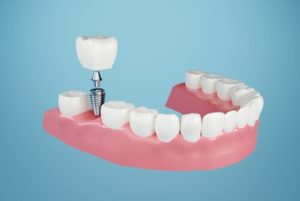Dental implants have emerged as a source of hope for many in the quest for a radiant, confident smile, especially for those seeking affordable solutions in dental care. This detailed guide will delve into the different facets of affordable dental implants, ensuring you are well-informed about this transformative option.
Understanding Dental Implants
Dental implants have revolutionised the approach to restoring missing teeth, offering a blend of innovation and practicality that has transformed countless smiles worldwide. This section is dedicated to demystifying dental implants – a remarkable blend of science and art in dentistry. We’ll explore what dental implants are, their composition, and why they are increasingly becoming the ideal selection for individuals seeking to replace missing teeth with solutions that look and feel like their natural counterparts. Whether you’re curious about this procedure or actively considering it, this guide aims to provide you with a comprehensive understanding of dental implants, setting the foundation for a well-informed decision.
What are Dental Implants?
Dental implants are specialised fixtures in dental care designed to replace missing teeth. Made typically from biocompatible materials like titanium, these implants are surgically positioned into the jawbone, acting as a robust foundation for artificial teeth.
The Anatomy of a Dental Implant
At their core, dental implants are composed of three key components:
- The Implant Post: This is the titanium screw that serves as a root substitute, firmly anchored into the jawbone.
- The Abutment: A connector piece that securely holds the artificial tooth in place.
- The Artificial Tooth: Often a crown, bridge, or denture, custom-made to match the natural teeth’ appearance and function.
The Role of Dental Implants in Oral Health
Dental implants go beyond cosmetic restoration; they are crucial in maintaining oral health. Here’s how:
- Preventing Bone Loss: Stimulating the jawbone helps maintain its density and prevent the bone loss that typically follows tooth loss.
- Enhancing Functionality: Implants restore chewing efficiency and speech clarity like natural teeth.
- Promoting Facial Structure Integrity: They help preserve the face’s natural shape by supporting the jawbone structure.
Dental implants signify a blend of technological advancement and practical application in dental treatment. They offer an effective, long-lasting solution for tooth loss, enhancing the aesthetics of one’s smile and contributing significantly to oral health. By understanding the intricate details of dental implants, individuals can make informed decisions about their dental care, confidently stepping towards a restored, healthy smile.
Why Choose Dental Implants?
Dental implants stand out as a superior choice for many patients when addressing the issue of missing teeth. This section delves into why dental implants are often preferred over other tooth replacement treatments, highlighting their unique benefits and the impact they can have on dental health and overall quality of life.
Mimicking Natural Teeth
One of the most compelling reasons to choose dental implants is their unparalleled ability to mimic natural teeth in function and appearance. Unlike dentures or bridges, which rest on the gum’s surface, dental implants are anchored directly into the jawbone, offering a level of stability and comfort that resembles that of natural teeth.
Preserving Jawbone Integrity
A critical advantage of dental implants is their role in preserving and protecting the jawbone. The absence of a tooth root can cause damage to the jawbone over time. Dental implants act as artificial tooth roots, stimulating the bone and preventing bone loss. This not only maintains the jaw’s structural integrity but also helps retain the face’s natural shape.
Long-Term Solution with a High Success Rate
Dental implants uplift a high success rate and are designed to be a long-term treatment for missing teeth. With proper upkeep and maintenance, implants can last a lifetime, making them an affordable choice in the long run. This longevity sets them apart from other options like bridges and dentures, which may require replacement or adjustment over time. Get more details.
Improved Oral Functionality and Comfort
Implants retrieve the ability to chew and speak with ease, just like natural teeth. They eliminate the discomfort and insecurity often associated with removable dentures, such as slipping or clicking sounds. This restoration of function goes a long way in improving the overall quality of life, allowing individuals to eat their favourite foods and engage in social situations without worry.
No Damage to Adjacent Teeth
Another significant benefit of dental implants is that they do not require the alteration or filing down of adjacent teeth, as is often necessary with bridges. This protection of natural tooth structure is beneficial for long-term oral health, reducing the risk of weakening surrounding teeth.
Easy Maintenance
Dental implants need the same upkeep as natural teeth, including regular brushing, flossing, and dental check-ups. There’s no need for additional cleaning procedures, making them a convenient choice for many people.
Enhancing Self-Esteem and Confidence
Lastly, dental implants can strongly impact a person’s self-esteem and confidence. They restore a natural-looking smile, significantly improving how individuals feel about their appearance. This boost in confidence can positively affect various aspects of life, from social interactions to professional opportunities.
The Dental Implant Procedure
Embarking on a journey towards high-quality dental implants involves a meticulous and detailed procedure, ensuring the best possible outcomes for patients. This section aims to provide a comprehensive overview of the dental implant procedure, illuminating each step of this transformative dental implant treatment.
Initial Consultation and Planning
The journey begins with an initial consultation. During this phase, the dental professional thoroughly examines the patient’s oral health. This includes assessing the jawbone’s condition, the gums’ health, and the overall suitability for dental implant surgery. Advanced imaging tricks, such as X-rays or CT scans, might be employed to create a detailed picture of the oral structure, facilitating precise planning for the implant placement.
Preparing for the Procedure
In some cases, preparations may be necessary before the dental implant treatment can commence. This could involve treatments for underlying oral health issues, such as gum disease, or procedures like bone grafting if the jawbone isn’t dense enough to support the implant.
The Surgical Phase of Dental Implant Procedures
Dental implant surgery is a key step in dental implant procedures. Performed under local anaesthesia, it involves the careful adjustment of the implant post into the jawbone. This surgical procedure is carried out with precision and care to ensure minimal discomfort and optimal placement for the implant.
Osseointegration: The Foundation of Success
Following the surgery, a crucial phase known as osseointegration begins. The implant gradually fuses with the jawbone during this period, creating a strong and sturdy foundation for the artificial tooth. This process can take several months, but it is important for the long-term success and stability of the dental implant.
Attaching the Abutment
Once osseointegration is complete, the next step of the dental implant treatment involves attaching the abutment. This procedure, which may require a minor surgery, involves fitting a small connector on the implant post. The abutment will hold and support the crown or artificial tooth.
The Final Restoration
The conclusory step in the dental implant procedure is the crown or artificial tooth placement. This part of the dental implant treatment involves creating a custom crown that matches the patient’s natural teeth’ colour, structure, and size. Once fitted onto the abutment, it completes the restoration, leaving the patient with a functional, aesthetically pleasing dental implant.
Post-Procedure Care and Follow-up
After the dental implant procedure is finished, proper aftercare is crucial. Patients are advised on how to care for their new implant, including hygiene practices and follow-up visits. Regular check-ups are essential to observe the health of the implant, the surrounding teeth, and the overall oral health.
Factors Influencing Dental Implants Cost
Navigating the financial aspects of dental implants, especially for those seeking options in Melbourne or considering cheap dental implants, requires an understanding of the various factors that influence their cost. This section will dissect these elements, clarifying what goes into the pricing of dental implants and how to make an informed decision when considering this treatment in Melbourne or other regions.
Number and Type of Implants
A primary determinant of cost is the number of implants required. A single dental implant will be less costly than multiple or full-mouth implants. Additionally, the specific type of dental implants used can influence the price. Certain cases may necessitate advanced or specialised implants, which can incur additional costs.
Dental Condition Complexity
The complexity of a patient’s dental condition is a critical factor in cost determination. For instance, those requiring preparatory procedures like bone grafts due to insufficient jawbone density will face higher costs. Pre-existing conditions like gum disease may also necessitate additional treatments, further impacting the overall price.
Material Quality
Surgical Expenses
The cost of the surgical procedure itself is a significant component. This encompasses the dentist’s fees, the technology and equipment used, and the complexity of the implant surgery. In Melbourne, as in other cities, more complex and time-consuming procedures will naturally be more expensive.
Geographic Location and Clinic Selection
Geographic location plays a role in the cost of dental implants. Melbourne, being an ideal location for dental implants, the pricing may differ from other regions due to varying living costs and the local demand for dental services. The selection of clinics and the dentist’s expertise also contribute to the cost, with high-end clinics and experienced dental professionals typically charging more for their services.
Aftercare and Additional Procedures
Post-implantation care, including follow-up visits and any necessary additional treatments, adds to the overall cost. Maintaining dental implants, although similar to natural teeth, may require periodic adjustments or maintenance, contributing to long-term expenses.
Insurance and Financing
The impact of dental insurance and available financing options must be considered. While some insurance plans might cover a portion of dental implants treatment costs, others may not offer such benefits. Financing plans can also make dental implants more affordable, especially for those seeking cheaper options in Melbourne.
Finding Affordable Dental Options
Finding a balance between affordability and quality is key for those considering dental implants. This segment focuses on strategies to seek out affordable dental options without compromising on the standard of care, particularly for those interested in dental implants.
Research and Compare Prices
Begin by conducting thorough research. Look for dental clinics in your area and compare their pricing for dental implants. Feel free to reach out to these clinics for detailed quotes. In metropolitan areas like Melbourne, for instance, the range of prices can be broad due to the competitive nature of dental services. Comparison shopping is essential to finding the most cost-effective option that doesn’t sacrifice quality.
Explore Dental Clinics Offering Payment Plans
Many dental clinics understand the financial burden that dental implants can pose and thus offer payment plans to their patients. These plans allow you to pay for dental implants over time, making the dental implant cost more manageable. Some clinics offer interest-free periods, which is particularly advantageous.
Check Insurance Coverage
Examine your dental insurance plan to see if it covers dental implants. While many dental insurance plans don’t cover implants, they may cover part of the cost, such as the crown, implant surgery, or related procedures like extractions. Understanding your insurance coverage can significantly reduce out-of-pocket expenses.
Look for Offers and Discounts
Keep an eye out for offers and discounts. Some dental clinics advertise dental implants, especially during certain times of the year. Following dental clinics on social media or subscribing to their newsletters can keep you in the loop about such opportunities.
Consider the Long-Term Value
When assessing affordability, consider the long-term value of the dental implants. Although the upfront cost may be higher than other tooth replacement options, dental implants’ durability and lower maintenance costs can make them more economical over time. Investing in high-quality dental implants can result in fewer dental visits and additional procedures in the future.
Conclusion
Expert guidance and professional care are crucial if you are considering dental implants as a treatment for your dental needs. Dr. Jack, a renowned implant dentist, is dedicated to providing top-notch dental implant services. With a focus on patient comfort and the use of advanced techniques, Dr. Jack and his team ensure a smooth, informed, and supportive journey toward achieving your perfect smile.
For a personalised consultation and to learn more about how dental implants can revolutionise your oral health and aesthetics, don’t hesitate to contact Dr Jack and his team at:
- Castle Hill: (02) 8806 3712
- Winston Hills: (02) 9000 1778
Take the first step towards a confident, radiant smile by contacting Dr Jack today. Your journey to a renewed smile and enhanced quality of life is just a phone call away!
Note: Any surgical or invasive procedure carries risks. Before proceeding, you should seek a second opinion from an appropriately qualified health practitioner.
References:
https://www.webmd.com/oral-health/dental-implants
perio.org/for-patients/periodontal-treatments-and-procedures/dental-implant-procedures/












